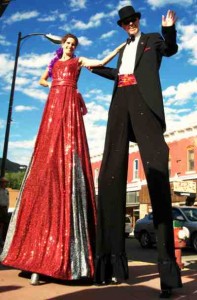Brief by Allen Best
Mountain Life – August 2007 – Colorado Central Magazine
It’s been more than three years since Marvin Heemeyer drove a bulldozer from the muffler shop he owned, the driver’s seat concealed in a fortress of concrete and steel, guns protruding, and proceeded to terrorize Granby for the better part of an afternoon.
Heemeyer damaged or gutted thirteen buildings during what was instantly labeled a “rampage.” Then his contraption stalled in the partially crumbled basement of a Gambles store. There, with his behemoth smoking, Heemeyer turned a gun on himself, taking no questions as to why.
A tape recording that had been mailed beforehand answered some questions. Heemeyer had felt wronged in a zoning dispute. He believed the town had incorrectly permitted a neighboring landowner to erect a noisy, dusty batch plant for gravel operations.
Among those sent fleeing for their lives that afternoon in 2004 was Patrick Brower, editor and publisher of the Sky-Hi News. Heemeyer’s grunting bulldozer crashed into the newspaper office only moments after Brower and another editor from nearby Winter Park fled out the back door.
Brower says that Granby has recovered physically. He admits that Granby needed a touch-up. It now has a brand new town hall and library, both bigger and better than what preceded them. The commercial buildings are mostly rebuilt.
But a legacy of sourness lingers, he says. Somebody with a project before the planning commission or town board will take umbrage at the first sign of evaluation. “Now I know how Marv felt,” they may say. Or, “Don’t make me pull another Marv.” And, “Maybe Marv wasn’t so crazy after all.”
Brower says government should not roll over and play dead. Small-town government is not “oppressive.” Town government, he says, had given Heemeyer some, but not all, of what he asked for. Heemeyer was not wronged — merely wrong.
“I hope people will think twice in the future about invoking Marv’s legacy of recklessness and costly revenge all in the name of pride and anger.”
End of story?
No. The next week the newspaper published a letter from Lenny Brooks “and everyone else that is sick of your tirade.” Like Heemeyer, Brooks lives in nearby Grand Lake at the entrance to Rocky Mountain National Park. He claims everyone he has talked with agrees that, had they walked in Heemeyer’s shoes, they, too, would have felt wronged.
“Everyone has limits, and when you’re pushed into a corner, you fight. Everyone fights with the weapons at hand,” he says.
“The law is not always black and white,” he adds. “Abuse of power can be subtle.”
But Brooks then concedes that Heemeyer was somehow different. He suggests that town officials should have realized they were dealing with a “perhaps unstable and passionate man, who had nothing left to lose.”



